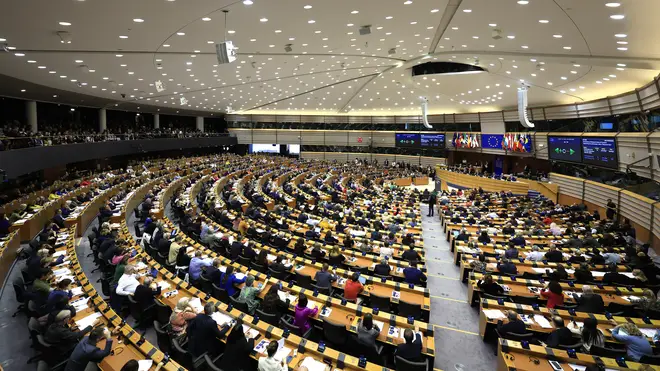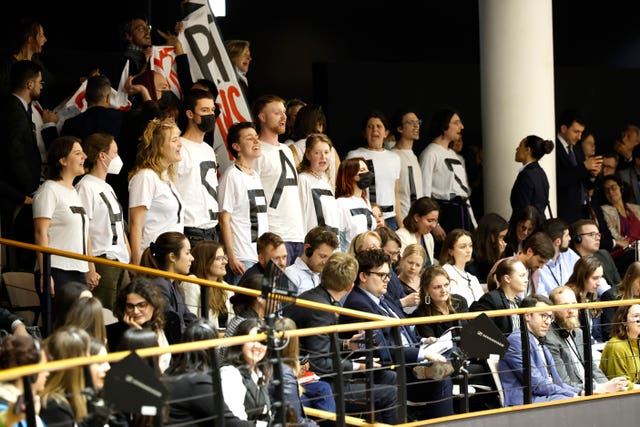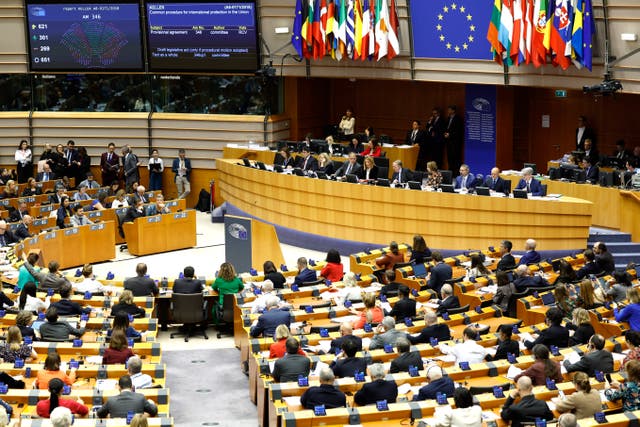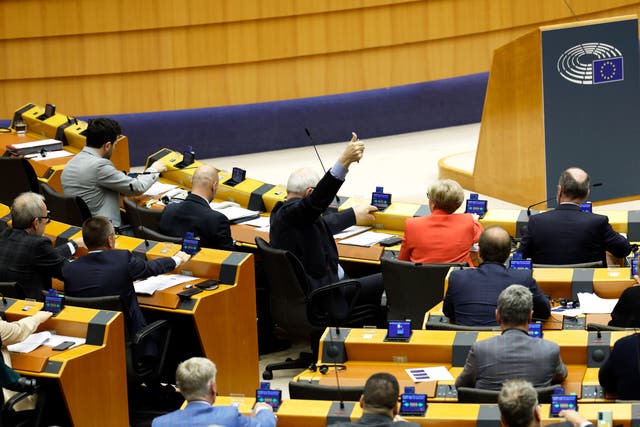
James O'Brien 10am - 1pm
10 April 2024, 18:54

The 27 EU member countries must now endorse the reform package, possibly in a vote in late April, before it can enter force.
European Union legislators have approved a major revamp of the bloc’s migration laws aimed at ending years of division over how to manage the entry of thousands of people without authorisation and depriving the far right of a vote-winning campaign issue ahead of June elections.
In a series of 10 votes, members of the European Parliament endorsed the regulations and policies that make up the Pact on Migration and Asylum.
The reforms address the thorny issue of who should take responsibility for migrants when they arrive and whether other EU countries should be obliged to help.
The proceedings were briefly interrupted by a small but noisy group of demonstrators in the public gallery who wore shirts marked “This pact kills” and shouted “Vote no!”

The 27 EU member countries must now endorse the reform package, possibly in a vote in late April, before it can enter force.
European Parliament president Roberta Metsola, a former lead legislator on migration who helped pave the way for the reform package, posted “History made” on X, formerly Twitter, after the votes.
“It has been more than 10 years in the making. But we kept our word. A balance between solidarity and responsibility. This is the European way,” she wrote.
German interior minister Nancy Faeser described the result as a “major and very important success”.
“After years of tough negotiations, we have agreed on this comprehensive package. We have thus overcome a deep division in Europe,” said Ms Faeser, whose country has been a top destination for people seeking refuge, in a written statement.
“We continue to protect people fleeing terrible wars, terror, torture and murder. But this responsibility for refugees will be spread across more shoulders in future,” she added.
The plan was drawn up after 1.3 million people, mostly those fleeing war in Syria and Iraq, sought refuge in Europe in 2015.
The EU’s asylum system collapsed, reception centres were overwhelmed in Greece and Italy, and countries further north built barriers to stop people entering.

But few have admitted to being happy with the new policy response to one of Europe’s biggest political crises, and even the legislators who drafted parts of the new regulations are unwilling to support the entire reform package.
“I’m not going to open a bottle of champagne after this,” Dutch legislator Sophie i’nt Veld, who drew up the assembly’s position on migrant reception conditions, told reporters on the eve of the plenary session in Brussels.
She said she planned to abstain from some of the votes.
Ms In’t Veld described the pact as “the bare minimum” in terms of a policy response, but she does not want to torpedo it by voting against.
“We will not have another opportunity to come to an agreement,” she said.
Swedish parliamentarian Malin Bjork, who worked on refugee resettlement, said that the pact does not respond to “any of the questions it was set to solve”.
She said the reform package “undermines the individual right to seek asylum” in Europe because it would build on plans that some EU countries already have to process migrants abroad.
Italy has concluded one such deal with Albania.

“We cannot have a situation where people systematically, in their thousands, die on their way seeking protection and refuge in Europe,” Ms Bjork told reporters.
The new rules include controversial measures: facial images and fingerprints could be taken from children from the age of six, and people may be detained during screening.
Fast-track deportation could be used on those not permitted to stay.
On the other side of the ledger, countries can be obligated to help their EU partners by offering to house people eligible for asylum or, failing that, to pay the costs of lodging them elsewhere.
Migrant and human rights groups mostly condemned the reform package.
In a joint statement, 22 charity groups, including the International Rescue Committee and Oxfam, said the pact “leaves troubling cracks deep within Europe’s approach to asylum and migration, and fails to offer sustainable solutions for people seeking safety at Europe’s borders”.
However, they did note that part of the reforms governing the resettlement of migrants to Europe from outside the bloc “offers a glimmer of hope for many refugees across the globe”.
Eve Geddie, from Amnesty International, described it as “a failure to show global leadership”.
“For people escaping conflict, persecution, or economic insecurity, these reforms will mean less protection and a greater risk of facing human rights violations across Europe – including illegal and violent pushbacks, arbitrary detention, and discriminatory policing,” she said.
Mainstream political parties wanted to secure agreement on the pact ahead of Europe-wide elections on June 6-9.
Migration is a likely campaign issue, and they believe the reforms address concerns about an issue that has been a consistent vote-winner for far-right parties.
In a post on X, Beata Szydlo, a member of Poland’s nationalist Law and Justice party and a former prime minister, criticised the pact on Wednesday.
“The migration policy of the EU is wrong and needs to be changed. But you can’t put out the fire by adding more oil to it,” she said.
The outcry over migrants in Europe focuses largely on the tiny minority of people who enter on unseaworthy boats or cross Europe’s borders on foot.
Millions enter legally each year.
Less than 10% are living in Europe illegally, and the majority of those entered with permission but refused to leave when their visas expired.
The main issue, once the regulations are completely endorsed, is whether the member countries will ever fully implement them, and whether the EU’s executive branch, the European Commission, will enforce the rules when it has chosen not to do so to avoid exacerbating the political crisis in recent years.